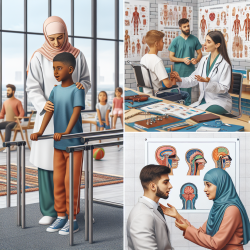Introduction
In the realm of special education, understanding and improving the lifestyle-related behaviors of elementary school children is crucial. The research article "Development and validation of a questionnaire to evaluate lifestyle-related behaviors in elementary school children" provides invaluable insights into this area. As a practitioner, you can leverage these findings to enhance your skills and contribute to the well-being of your students.
The SI! Program: A Comprehensive Approach
The SI! Program is a school-based intervention aimed at promoting cardiovascular health among children. It focuses on four key components: diet, physical activity, understanding the body and heart, and managing emotions. The program is designed to be a long-term intervention, covering children from kindergarten to secondary education.
The core of the SI! Program lies in its ability to adapt strategies and materials to the developmental level of children, making it an effective tool for health promotion. The program involves not just the children, but also teachers, families, and the school environment, creating a holistic approach to health education.
Introducing the KAH-Questionnaire
The KAH-questionnaire is a key tool developed to assess the efficacy of the SI! Program. It evaluates children's knowledge, attitudes, and habits (KAH) towards a healthy lifestyle. The questionnaire is divided into four components, each corresponding to a part of the SI! Program: diet, physical activity, understanding the body and heart, and emotions management.
With an overall Cronbach’s alpha of 0.791, the questionnaire is a reliable instrument for measuring the impact of the SI! Program on instilling healthy behaviors in elementary school children.
How Practitioners Can Benefit
As a practitioner, you can utilize the KAH-questionnaire to evaluate and improve the lifestyle-related behaviors of your students. Here are some ways to implement the outcomes of the research:
- Integrate the Questionnaire: Use the KAH-questionnaire as a part of your assessment toolkit to monitor students' progress in adopting healthy behaviors.
- Customize Interventions: Tailor your interventions based on the specific needs identified through the questionnaire results.
- Collaborate with Stakeholders: Work with teachers, parents, and other stakeholders to create a supportive environment for students to practice healthy behaviors.
- Encourage Further Research: Stay updated with the latest research and developments in lifestyle-related behaviors to continuously improve your practice.
Conclusion
The development and validation of the KAH-questionnaire represent a significant advancement in evaluating lifestyle-related behaviors in elementary school children. By implementing the outcomes of this research, practitioners can play a pivotal role in promoting healthier lifestyles among their students.
To read the original research paper, please follow this link: Development and validation of a questionnaire to evaluate lifestyle-related behaviors in elementary school children.










